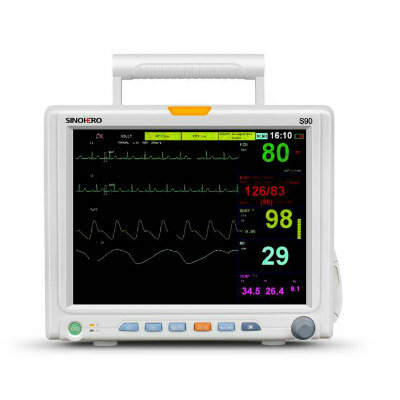Dopamine Receptors Implicated in Obesity
|
By HospiMedica staff writers Posted on 06 Feb 2001 |
Researchers have discovered that a deficiency of dopamine in the brain may explain why some individuals engage in pathological overeating. The study was sponsored by the U.S. National Institute on Drug Abuse, and the findings were published in the February issue of The Lancet.
In the study, involving 10 severely obese individuals and 10 controls, dopamine receptors in the brain were measured with positron emission tomography (PET) scans and other tests. These showed that dopamine receptors values were significantly lower in obese subjects than in the controls. An additional finding was that body mass index correlated negatively with the measures of dopamine receptors. Subjects with the lowest dopamine receptor values had the largest body mass index.
Dopamine helps regulate feelings of pleasure and modulates the rewarding properties of food. The researchers believe that individuals deficient in dopamine receptors may need to eat more than people with higher dopamine levels to induce feelings of satisfaction and gratification. A reduction in dopamine receptors has also been noted in individuals addicted to various types of drugs including cocaine, alcohol, and opiates. Thus, dopamine deficiency may be associated with addictive behavior whether related to food or to drugs.
Previous studies have found that certain antipsychotic medications result in weight gain, while drugs such as methamphetamine that increase dopamine levels diminish appetite. This suggests that improving dopamine receptor function might lead to a better treatment for obesity.
"Currently, the most appropriate practical application of this finding is to urge overweight individuals to exercise,” noted Dr. Gene-Jack Wang, of Brookhaven National Laboratory, who headed the team of researchers. "In laboratory animals, exercise has been shown to increase dopamine release and to increase the number of dopamine receptors, which would help quell the urge to pathologically overeat.”
Related Links:
The Lancet
National Institute on Drug Abuse
In the study, involving 10 severely obese individuals and 10 controls, dopamine receptors in the brain were measured with positron emission tomography (PET) scans and other tests. These showed that dopamine receptors values were significantly lower in obese subjects than in the controls. An additional finding was that body mass index correlated negatively with the measures of dopamine receptors. Subjects with the lowest dopamine receptor values had the largest body mass index.
Dopamine helps regulate feelings of pleasure and modulates the rewarding properties of food. The researchers believe that individuals deficient in dopamine receptors may need to eat more than people with higher dopamine levels to induce feelings of satisfaction and gratification. A reduction in dopamine receptors has also been noted in individuals addicted to various types of drugs including cocaine, alcohol, and opiates. Thus, dopamine deficiency may be associated with addictive behavior whether related to food or to drugs.
Previous studies have found that certain antipsychotic medications result in weight gain, while drugs such as methamphetamine that increase dopamine levels diminish appetite. This suggests that improving dopamine receptor function might lead to a better treatment for obesity.
"Currently, the most appropriate practical application of this finding is to urge overweight individuals to exercise,” noted Dr. Gene-Jack Wang, of Brookhaven National Laboratory, who headed the team of researchers. "In laboratory animals, exercise has been shown to increase dopamine release and to increase the number of dopamine receptors, which would help quell the urge to pathologically overeat.”
Related Links:
The Lancet
National Institute on Drug Abuse
Latest Patient Care News
- Portable Biosensor Platform to Reduce Hospital-Acquired Infections
- First-Of-Its-Kind Portable Germicidal Light Technology Disinfects High-Touch Clinical Surfaces in Seconds
- Surgical Capacity Optimization Solution Helps Hospitals Boost OR Utilization

- Game-Changing Innovation in Surgical Instrument Sterilization Significantly Improves OR Throughput
- Next Gen ICU Bed to Help Address Complex Critical Care Needs
- Groundbreaking AI-Powered UV-C Disinfection Technology Redefines Infection Control Landscape
- Clean Hospitals Can Reduce Antibiotic Resistance, Save Lives
- Smart Hospital Beds Improve Accuracy of Medical Diagnosis
- New Fast Endoscope Drying System Improves Productivity and Traceability
- World’s First Automated Endoscope Cleaner Fights Antimicrobial Resistance
- Portable High-Capacity Digital Stretcher Scales Provide Precision Weighing for Patients in ER
- Portable Clinical Scale with Remote Indicator Allows for Flexible Patient Weighing Use
- Innovative and Highly Customizable Medical Carts Offer Unlimited Configuration Possibilities
- Biomolecular Wound Healing Film Adheres to Sensitive Tissue and Releases Active Ingredients
- Wearable Health Tech Could Measure Gases Released From Skin to Monitor Metabolic Diseases
- Wearable Cardioverter Defibrillator System Protects Patients at Risk of Sudden Cardiac Arrest
Channels
Critical Care
view channel
Ingestible Smart Capsule for Chemical Sensing in the Gut Moves Closer to Market
Intestinal gases are associated with several health conditions, including colon cancer, irritable bowel syndrome, and inflammatory bowel disease, and they have the potential to serve as crucial biomarkers... Read moreNovel Cannula Delivery System Enables Targeted Delivery of Imaging Agents and Drugs
Multiphoton microscopy has become an invaluable tool in neuroscience, allowing researchers to observe brain activity in real time with high-resolution imaging. A crucial aspect of many multiphoton microscopy... Read more
Novel Intrabronchial Method Delivers Cell Therapies in Critically Ill Patients on External Lung Support
Until now, administering cell therapies to patients on extracorporeal membrane oxygenation (ECMO)—a life-support system typically used for severe lung failure—has been nearly impossible.... Read moreSurgical Techniques
view channel
Pioneering Sutureless Coronary Bypass Technology to Eliminate Open-Chest Procedures
In patients with coronary artery disease, certain blood vessels may be narrowed or blocked, requiring a stent or a bypass (also known as diversion) to restore blood flow to the heart. Bypass surgeries... Read more
Intravascular Imaging for Guiding Stent Implantation Ensures Safer Stenting Procedures
Patients diagnosed with coronary artery disease, which is caused by plaque accumulation within the arteries leading to chest pain, shortness of breath, and potential heart attacks, frequently undergo percutaneous... Read more
World's First AI Surgical Guidance Platform Allows Surgeons to Measure Success in Real-Time
Surgeons have always faced challenges in measuring their progress toward surgical goals during procedures. Traditionally, obtaining measurements required stepping out of the sterile environment to perform... Read moreHealth IT
view channel
Printable Molecule-Selective Nanoparticles Enable Mass Production of Wearable Biosensors
The future of medicine is likely to focus on the personalization of healthcare—understanding exactly what an individual requires and delivering the appropriate combination of nutrients, metabolites, and... Read more
Smartwatches Could Detect Congestive Heart Failure
Diagnosing congestive heart failure (CHF) typically requires expensive and time-consuming imaging techniques like echocardiography, also known as cardiac ultrasound. Previously, detecting CHF by analyzing... Read moreBusiness
view channel
Expanded Collaboration to Transform OR Technology Through AI and Automation
The expansion of an existing collaboration between three leading companies aims to develop artificial intelligence (AI)-driven solutions for smart operating rooms with sophisticated monitoring and automation.... Read more

















